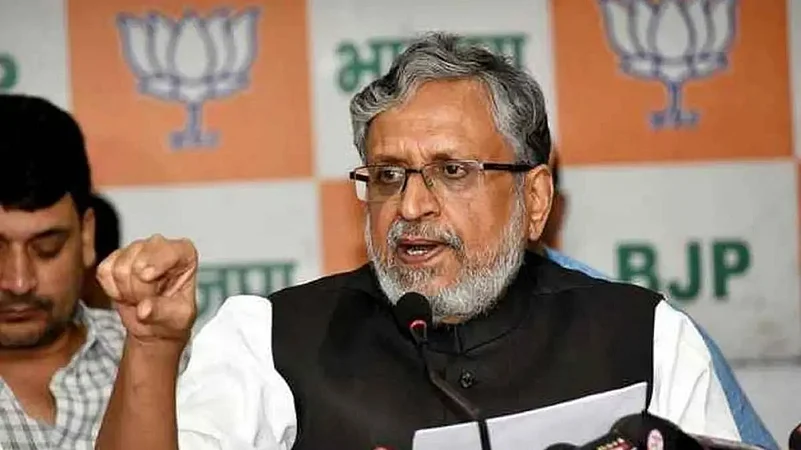Rajya Sabha Member from BJP and former Deputy Chief Minister of Bihar Sushil Kumar Modi, on March 28, asked the government to increase tax on cryptocurrencies from the current rate of 30 per cent, saying they are a form of gambling, and countries like Japan, Germany, France and Austria have imposed as much as 40-50 per cent tax on it. In an exclusive interview with Outlook Money, he shares his views on cryptocurrencies and blockchain. Edited excerpts:
Q: Why do you think tax on cryptocurrencies and digital assets should be more than 30 per cent?
Sushil Kumar Modi: The main reason is that I believe (trading in) cryptocurrencies is pure gambling. Even the government has said that it is a completely speculative market and is similar to gambling, (buying) lottery and horse racing. Also, we want to discourage this industry, as no one knows when this bubble will burst, and millions of people will get ruined financially. That’s the reason why the government has kept this 30 per cent (tax) slab. But it has been seen that several countries like Japan have kept the slab 40-50 per cent. I believe that crypto is like tobacco or liquor. As the government is facing issues in categorisation of crypto, I requested that they make a new slab and impose more tax on it so that the government can get revenue and people can be discouraged from investing in this volatile asset.
Q: What do you think about GST (goods and services tax) on cryptocurrencies?
Modi: As of now, there is no specific GST on cryptocurrency; it is only 18 per cent on exchanges as they provide services. So, for that particular service, they have to give an already defined GST. However, if we look at gambling-like sectors, there is GST on the whole transaction. For example, if you buy a lottery ticket for Rs 100, then you have to pay 28 per cent more on it. If you bet Rs 1 lakh in a casino, then you have to pay Rs 28,000 as GST, which is apart from the tax on the service provider. There should be tax on the whole transaction value.
Now it is up to the GST Council to impose tax on the whole transaction like they impose 3 per cent GST on gold. Our main motive should be to discourage the whole crypto industry and business.
Q: Congress member and Lok Sabha MP Gaurav Gogoi says the government is giving mixed signals regarding cryptocurrencies in India. Why is the government not giving clarity on crypto regulations?
Modi: This subject is so complex that immediate clarity is not possible. The government is discussing this subject with institutions such as IMF (International Monetary Fund) and the World Bank and hopes to come out with a consultation paper soon. The government is not in a mood to take any decision in a hurry as this technology is new for all of us.
At present, there is confusion about this industry across the world—whether to ban it or not; how to approach the regulations etc. There is a need to take a common view on this new technology. Overall, it’s gambling. There is no intrinsic value behind this new technology. It is only based on codes, and it is not like traditional assets such as gold where we have something to showcase to the people.

Q: Won’t that suppress innovation and demotivate the youth?
Modi: Are ‘.com’ and ‘internet’ the same? We are not discouraging the blockchain technology on which this cryptocurrency is based. There are several possibilities for blockchain (usage) such as land records, health records, counting, etc. There is no advantage of cryptocurrency for this country. I request the youth of this nation to not go towards cryptocurrency.
Also, we have given enough time to the small investor to withdraw their money and exit this industry.
Q: Should cryptocurrencies be banned in India?
Modi: I do not want to give any opinion on whether crypto should be banned or not. It’s a matter that needs a larger discussion and we have to wait for some time for that. But in case the government bans crypto, then it will have no function in India, no norms regarding KYC will work. Then whatever things (transactions) happen, they would all be illegal. Also, ‘effective banning’ is important.
Mining cryptos is very difficult in India. Countries whose economy is in a horrific situation, such as El Salvador and Ukraine, have legalised it. (Overall, bringing in a) crypto regulation is not easy.
Q: According to the crypto industry, a TDS of 1 per cent is very high.
Modi: A 1 per cent TDS is not a burden. It is adjustable later. It (TDS) has been imposed to track the number of investors. Overall, from what I understand, the government wants to dissuade young people from (investing in) cryptos. We want to directly stop people from jumping into this crypto well.













